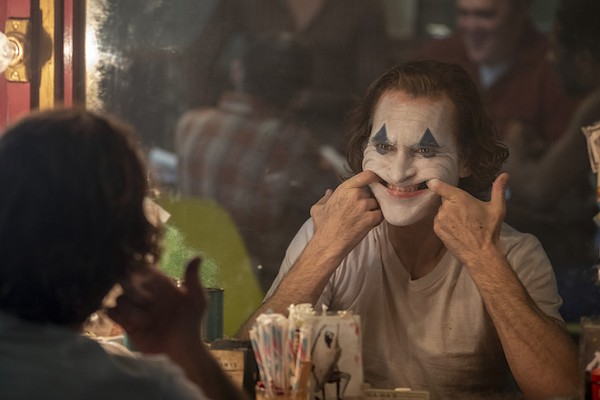Joker
Joker, 2019, 4 ¼ stars
Joker is seriously good
Origin story exposes brutality in all of us
From The Orlando Weekly, October 3, 2019
The Joker has been around for almost 80 years, but before Todd Phillips’ new film reimagined the character, I felt like I never really knew him. That’s the top takeaway from a movie that is destined to become a defining moment of the comic-book genre. And that’s no joke.
Joker, which Phillips (Road Trip and the Hangover movies) directed and co-wrote with Scott Silver, is an origin story. Set in the late ‘70s or early ‘80s in New York City – um, I mean Gotham – this is the tale of Arthur Fleck, a for-hire clown who, after getting fired, turns to standup comedy despite being neither funny nor personable. But he can sure make a crowd laugh. Unfortunately, that laughter is more suited to an asylum than a comedy club.
But Arthur persists, caring for his mother while suppressing his dangerously psychotic tendencies. For comfort, he tries to flirt with his next-door neighbor and dreams of hitting it big on Live with Murray Franklin, Gotham’s answer to The Tonight Show Starring Johnny Carson. And just like millions of people outside the movies, he stays prescription-drugged to his crazy eyeballs. But when Gotham cuts the social-welfare programs that keep him medicated, he must fend for himself. Sound familiar?
As Arthur (and the title character), Joaquin Phoenix channels both mania and depression. No offense to Jack Nicholson or Heath Ledger, but Phoenix’s Joker is more raw, more real, less of a joke. And given the actor’s penchant for odd behavior – remember that David Letterman weirdness back in 2009? – his brand of crazy gets under your skin and stays there. Yet somehow his performance also contains deep sadness and relatability. We’ve all got a little Joker in us, it seems.
Joker exists, of course, in the world of DC Comics’ Batman with which we’re all familiar. But this is a new story with twists and thematic variations all its own, in addition to a wonderfully eclectic, partially anachronistic soundtrack. Nevertheless, just as the original Joker character was visually inspired by Paul Leni’s 1928 film, The Man Who Laughs, the new Joker draws its dark inspiration from all Batman-themed films and comics that precede it, especially Alan Moore’s 1988 graphic novel, Batman: The Killing Joke, which imagined the Joker as a comedian.
But films and directors from other genres are woven into Phillips’ reinterpretation too. Charlie Chaplin and Martin Scorsese have a distinct presence, especially the latter’s Taxi Driver and The King of Comedy. (It’s no coincidence that Robert De Niro plays Arthur’s hero, Murray Franklin.)
Look also for influences from M. Night Shyamalan’s Unbreakable, which, like Joker, is a non-traditional comic-book film. Indeed, if you changed just a few details, both films would exit the comic-book genre and become either dramas or psychological thrillers. But regardless of category, both movies possess uncommon intensity and power, and belong among the top five comic-book films of all time.
With power comes responsibility, though, and all artists, Phillips included, must take ownership of their creation. The uncomfortable truth is that some might think Joker glorifies violence or, even worse, portrays it as an understandable option for the mentally ill and disenfranchised. The film’s content becomes even more controversial when viewed in the light of the 2012 massacre in Aurora, Illinois, when a deranged gunman shot to death 12 audience members of Christopher Nolan’s The Dark Knight Rises.
Phillips and Nolan are just two of many directors who have become embroiled in this debate. Filmmakers throughout history, especially during the Production Code collapse of the late ‘60s and ‘70s, have faced scrutiny over their movie’s violent content. Stanley Kubrick even pulled A Clockwork Orange from British distribution after a series of copycat crimes. Joker is no Orange, but the fact that both are part of the same conversation proves the quality of Phillips’ film.
Kubrick wasn’t to blame for the real-world “ultra-violence,” and neither would Phillips if – God and much-needed gun laws forbid – a sick individual were equally inspired by his film. But we also must come to terms with our often unhealthy fascination with movie violence and our abandonment of those in need of mental and emotional support.
“Is it just me, or is it getting crazier out there?” Arthur ponders.
Perhaps it is, but that’s not just Phillips’ job to solve. It’s ours. Until then, let us embrace the director’s freedom of expression and powerful storytelling while doing our best to keep this type of brutality in the only place it belongs: on the screen.
Copyright 2019 © Orlando Weekly / Cameron Meier
Epilogue: My reaction to the reaction
I’m surprised and disappointed with some of my fellow critics’ response to Joker. Much of their analysis seems to be limited to “I didn’t like it” or “It’s unpleasant” or “It doesn’t send the proper social and cultural message.” Well, I somewhat agree with all three statements. But those are more knee-jerk reactions than a critique of a piece of art. Powerful and well-executed art is often unpleasant, and Joker is an example of that. If you have problems with the craft of the film itself, that’s one thing. But to say “I hate it” is actually reaffirming its power.
